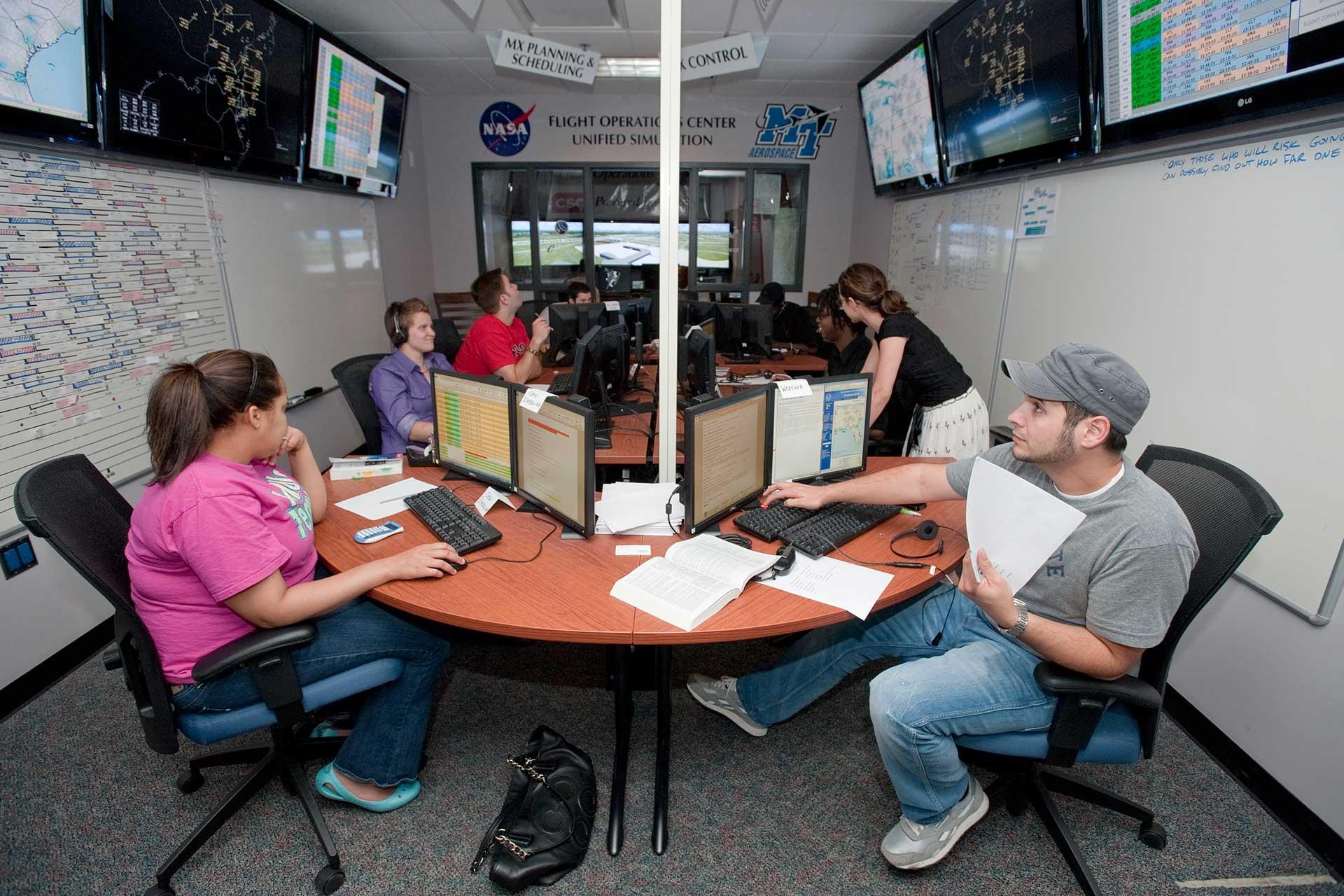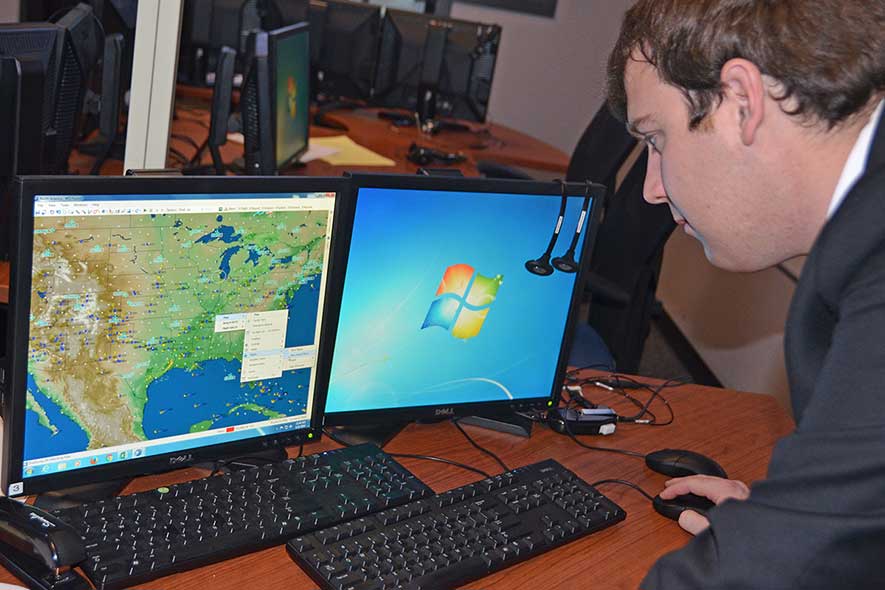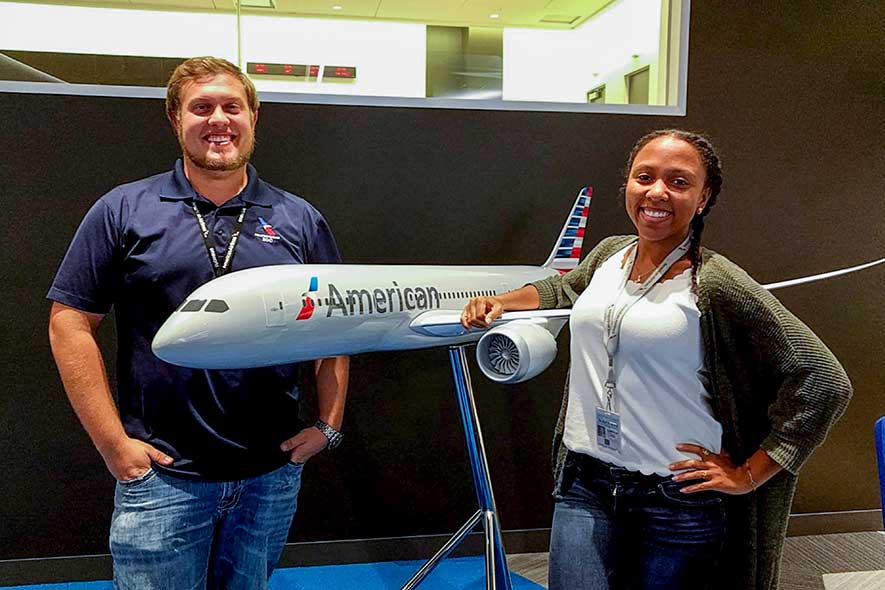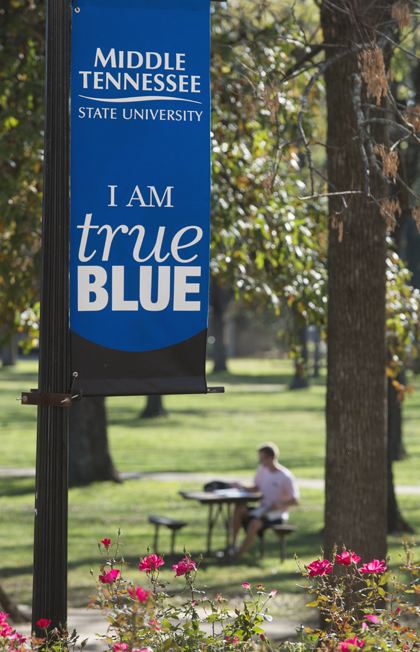
Aerospace
Prepare for an aerospace career with MTSU's Flight Dispatch concentration.
Aerospace, Flight Dispatch Concentration, B.S.
Aviation safety depends on communication between pilots and dispatchers — those individuals who, along with air carrier pilots, share joint responsibility for safe operational control of company flights. The Flight Dispatch concentration is designed to meet industry demands and leads to FAA Aircraft Dispatch certification. With a superior reputation, the program has graduates that dispatch for every regional and major airline. Students receive extensive training in dispatch operations with an emphasis on the importance of operational control between the dispatcher and pilot in command. Students are expected to learn federal aviation regulations, weather theory and application of weather products, aircraft performance, aircraft systems, and limitations, the application of minimum equipment lists, and human factors considerations. The mission of the Flight Dispatch Concentration is to prepare our students to become the leaders of the next generation of aerospace professionals by developing the knowledge, skills, and attitudes necessary for successful careers in aerospace.
If you live in one of these states: AR; you may be able to attend MTSU at in-state rates under the Academic Common Market program.
News Briefs

WSI Fusion software gives students distinct advantage
Thanks to a gift from The Weather Company, an IBM business, MTSU students are the first in the nation to get to use an industry-leading aviation operations management software — WSI Fusion — in the simulation lab. WSI Fusion is an advanced, proactive flight monitoring application that fuses public and proprietary weather information with real-time flight and airspace data into one common view, facilitating timely communication directly with aircraft and helping dispatchers stay aware of changing weather conditions. Southwest Airlines, sponsor of MTSU's Flight Operations Center-Unified Simulation Lab (FOCUS) as well as a user of WSI Fusion, helped facilitate the gift. "This is an amazing opportunity for our students to gain familiarity with airline weather and dispatching software," says Andrea Georgiou, the faculty member who helped the department secure the product. "MTSU Aerospace students will have a major advantage over other college applicants when applying to the airlines." Department Chair Wendy Beckman reiterated, "Our flight dispatch students in particular will benefit from familiarity with the software package as they apply for jobs. We are very appreciative of Southwest Airlines and The Weather Company for allowing our students this opportunity."

Grads enjoy the challenge and flexibility of flight dispatch
Camelia Barkley and Josh Anderson, flight dispatchers with American Airlines in Dallas, TX, believe they ended up in the best jobs in aviation. "Flight dispatch is the brain of the operation; everything comes through us," says Barkley. Anderson defines dispatchers as "problem solvers," explaining the breadth of their responsibilities — from developing flight plans to cancelling flights, then dealing with the impact of such decisions. Weather, maintenance, passenger health, crew condition — all are part of the mix. "We have the final say in changing or cancelling a flight," says Anderson, acknowledging that their decisions probably result in screams from affected passengers. In spite of days with barely time for a break, they both recommend the profession with its six-figure salaries, flexible schedules, and free flights. Barkley, who started with American in 2012, describes flight dispatch as "the best kept secret in aviation." Since high school, she wanted to be an air traffic controller, musing, "I didn't know what a dispatcher was." She was too young at graduation to be an air carrier dispatcher (must be 23); so she started with the dispatch of chartered flights and discovered that she liked it and then moved on to dispatch of commercial flights when she had the age and opportunity. Anderson says he followed a path similar to Barkley's, but he decided before graduation to "go all dispatch." He joined American Airlines in 2014 and was surprised but pleased to have Barkley, who had spoken to his MTSU class, as his trainer. Both praise the thoroughness of MTSU's program and especially the dedication and involvement of program coordinator Andrea Georgiou. Both like coming back to speak to classes because they see the importance of giving students an understanding of their future profession.
News Briefs
WSI Fusion software gives students distinct advantage

Thanks to a gift from The Weather Company, an IBM business, MTSU students are the first in the nation to get to use an industry-leading aviation operations management software — WSI Fusion — in the simulation lab. WSI Fusion is an advanced, proactive flight monitoring application that fuses public and proprietary weather information with real-time flight and airspace data into one common view, facilitating timely communication directly with aircraft and helping dispatchers stay aware of changing weather conditions. Southwest Airlines, sponsor of MTSU's Flight Operations Center-Unified Simulation Lab (FOCUS) as well as a user of WSI Fusion, helped facilitate the gift. "This is an amazing opportunity for our students to gain familiarity with airline weather and dispatching software," says Andrea Georgiou, the faculty member who helped the department secure the product. "MTSU Aerospace students will have a major advantage over other college applicants when applying to the airlines." Department Chair Wendy Beckman reiterated, "Our flight dispatch students in particular will benefit from familiarity with the software package as they apply for jobs. We are very appreciative of Southwest Airlines and The Weather Company for allowing our students this opportunity."
Grads enjoy the challenge and flexibility of flight dispatch

Camelia Barkley and Josh Anderson, flight dispatchers with American Airlines in Dallas, TX, believe they ended up in the best jobs in aviation. "Flight dispatch is the brain of the operation; everything comes through us," says Barkley. Anderson defines dispatchers as "problem solvers," explaining the breadth of their responsibilities — from developing flight plans to cancelling flights, then dealing with the impact of such decisions. Weather, maintenance, passenger health, crew condition — all are part of the mix. "We have the final say in changing or cancelling a flight," says Anderson, acknowledging that their decisions probably result in screams from affected passengers. In spite of days with barely time for a break, they both recommend the profession with its six-figure salaries, flexible schedules, and free flights. Barkley, who started with American in 2012, describes flight dispatch as "the best kept secret in aviation." Since high school, she wanted to be an air traffic controller, musing, "I didn't know what a dispatcher was." She was too young at graduation to be an air carrier dispatcher (must be 23); so she started with the dispatch of chartered flights and discovered that she liked it and then moved on to dispatch of commercial flights when she had the age and opportunity. Anderson says he followed a path similar to Barkley's, but he decided before graduation to "go all dispatch." He joined American Airlines in 2014 and was surprised but pleased to have Barkley, who had spoken to his MTSU class, as his trainer. Both praise the thoroughness of MTSU's program and especially the dedication and involvement of program coordinator Andrea Georgiou. Both like coming back to speak to classes because they see the importance of giving students an understanding of their future profession.
Related Media

Employers around the world recognize MTSU's Flight Dispatch major the Aerospace program as an elite program that produces the highest caliber graduates. Examples of career options include
- Air carrier flight dispatcher (regional or major)
- Air carrier crew scheduler (regional or major)
- Air freight/cargo flight dispatcher
- Air taxi or charter flight dispatcher
- Corporate flight department dispatcher
Employers of MTSU alumni include, but are not limited to, the following:
- American Airlines – Fort Worth, TX
- American Eagle Airlines – Fort Worth, TX
- Delta Airlines – Atlanta, GA
- Federal Aviation Administration – Washington, DC
- FedEx Express – Memphis, TN
- Republic Airways – Indianapolis, IN
- SkyWest Airlines – St. George, UT
- Southwest Airlines – Dallas, TX
- United Airlines – Chicago, IL
- United Parcel Service (UPS) – Atlanta, GA



Professional Licensure Disclosure
The Bachelor of Science in Aerospace, Flight Dispatch (BS Aerospace, Flight Dispatch) in the College of Basic and Applied Sciences is accredited by the Aviation Accreditation Board International (AABI) and is an approved Federal Aviation Administration (FAA) 14 CFR Part 65 Aircraft Dispatcher school. Admission to the BS Aerospace, Flight Dispatch does not guarantee that students will earn FAA Aircraft Dispatcher certification, which is required for successful completion of the 120-hour program.
FAA Aircraft Dispatcher Certification is a federally established license. The BS Aerospace, Flight Dispatch disclosure provided on MTSU’s professional licensure disclosure website indicates the states and territories where MTSU has determined, through reasonable and good faith effort, that the program does or does not meet the educational requirements for other US states and territories. Certification requirements may include additional and recurring requirements, such as an application, supervision, examinations, continuing education, fees, fingerprinting, a background check, etc. MTSU strongly recommends that prospective and current students discuss their plans with an advisor to ensure they have the most up-to-date information and guidance regarding licensure requirements.
For additional information about the Department, including information on scholarships specific to Aerospace students, please visit the Aerospace Department.

CONTACT US

Please fill in the form below and we will contact you very soon











